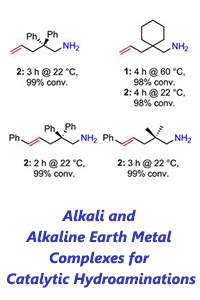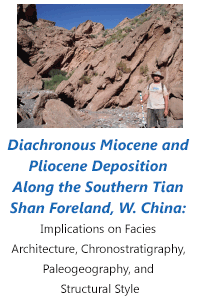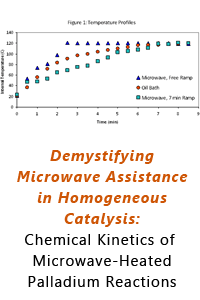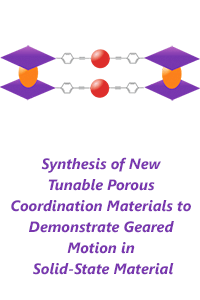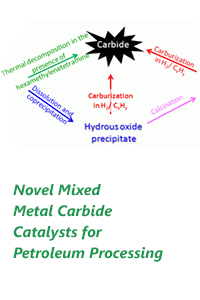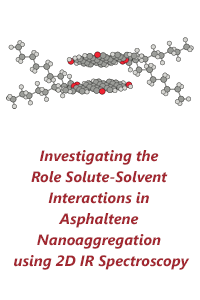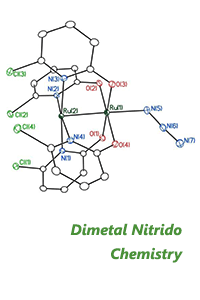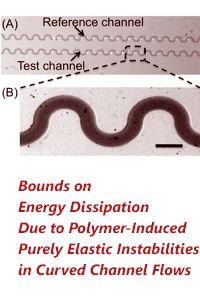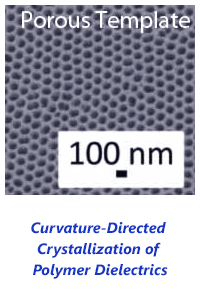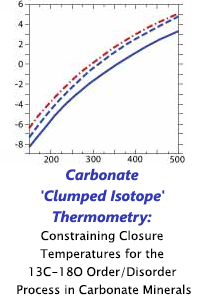57th Annual Report on Research 2012 Under Sponsorship of the ACS Petroleum Research Fund
Dr. Amy E. Keirstead
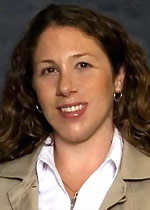 Department of Chemistry and Physics
Department of Chemistry and Physics
University of New England
Using the Photo-Fries Reaction as a Photochemical Probe to Quantify the Cage Effects of Ionic Liquids
Dr. Amy Keirstead's research focuses on the properties of ionic liquids, which are salts, however they are liquids at room temperature. Ionic liquids are being considered for a wide variety of applications, including chemical synthesis and catalysis, hosts for molecular electronic devices and electrically conducting fluids for batteries and photovoltaic cells. Dr. Keirstead says that "most systems currently use organic solvents that are volatile, so evaporation of these solvents into the atmosphere has an impact on the environment." Due to their low volatility and recyclability, ionic liquids are considered "green solvents" for variety of applications.
Keirstead's ACS PRF grant supports her research on the cage effects of ionic liquids. According to Keirstead, "the cage effect is a measure of restriction, which dictates how likely a molecule is to escape its original solvent cage, and can influence the efficiency or outcome of a chemical reaction". To quantify this effect in ionic liquids, she is using the Photo-Fries reaction as the probe system, where exposure of an aromatic ester to UV light generates radical species that form different products depending on the cage effect that they experience. By examining this property, a better understanding of cage effects in ionic liquids will be achieved for future applications. She notes that "if we are carrying out a chemical reaction we might want a large cage effect, so we would select an ionic liquid that is best for that application". Conversely, large cage effects could negatively impact the efficiency of photovoltaic and electronic devices.
Her initial inspiration for this research came from discussions at the 2003 ACS Summer School on Green Chemistry. She states "This was a time when the real pioneers of ionic liquid chemistry were reporting on their initial results, which reminded me of the early work done on zeolites that I was studying in my Ph.D. research." After obtaining her Ph.D. in Physical Organic Chemistry from Dalhousie University in Nova Scotia, and completing a post-doctoral fellowship at Arizona State University, Keirstead accepted a position as an Assistant Professor of Chemistry at the University of New England (UNE) in Biddeford, Maine. Performing research at a primarily undergraduate institution means designing projects that can be done with limited resources and engaging undergraduate students in her project. In developing her research program, she thought, "let's take a lesson from the work that was done to characterize the properties of zeolites and apply the same type of fundamental studies to this newer class of materials, ionic liquids."
Keirstead expected there would be a fairly significant cage effect because ionic liquids are so viscous, and that's what her research has shown. She says "In the next five years, I would like to expand my study to a wider variety of ionic liquids to obtain a better understanding of which factors influence the cage effect. I'd also like to explore how ionic liquids can modify or influence the conformation or shape that compounds can adopt."
Keirstead feels that ACS PRF has been essential in developing her research program, and with this grant, her research program "has really taken off." Keirstead has supported undergraduate summer research, and the ACS PRF funding enables her students to travel with her to attend conferences and to present their results at symposia. As an outgrowth of her ACS PRF funding, she and several of her colleagues have received a Major Research Instrumentation (MRI) grant from NSF to purchase a gas chromatograph-mass spectrometer that is used in her work. "I strongly feel that because I had ACS PRF support for my research, it helped us acquire that instrument. So, it's not just a two-year award, but an investment in the future of my research program and my students."
Grant 51292-UNI4: Read Keirstead's Annual Report
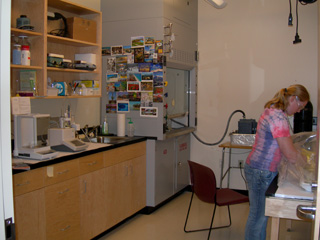 Undergraduate student Amber Zablowsky prepares ionic liquid samples for irradiation in a glovebag filled with dry nitrogen, which is necessary to protect the samples from atmospheric moisture.
Undergraduate student Amber Zablowsky prepares ionic liquid samples for irradiation in a glovebag filled with dry nitrogen, which is necessary to protect the samples from atmospheric moisture.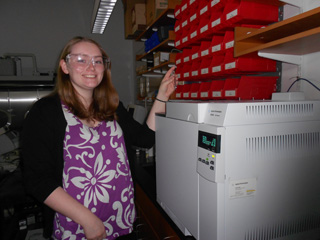 Undergraduate student Lindsey LaPointe injects a sample into the gas chromatograph to analyze product distributions from the photo-Fries reaction carried out in ionic liquids.
Undergraduate student Lindsey LaPointe injects a sample into the gas chromatograph to analyze product distributions from the photo-Fries reaction carried out in ionic liquids.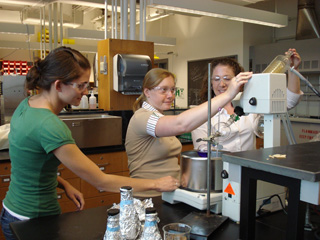 Amy Keirstead shows undergraduate students Robyn Gaudet and Amber Zablowsky the technique of rotary evaporation.
Amy Keirstead shows undergraduate students Robyn Gaudet and Amber Zablowsky the technique of rotary evaporation.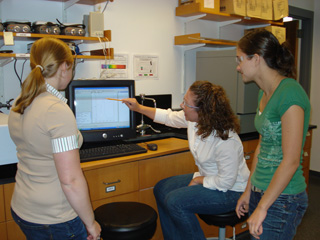 Amy Keirstead discusses UV-Vis data with undergraduate students Amber Zablowsky and Robyn Gaudet.
Amy Keirstead discusses UV-Vis data with undergraduate students Amber Zablowsky and Robyn Gaudet.
